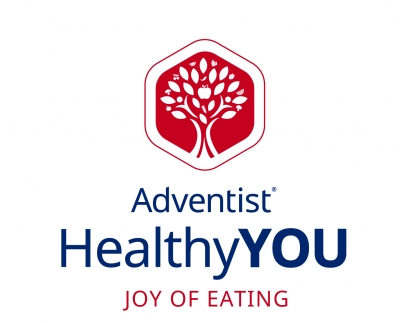Food and Mood
How what we eat affects how we feel
Contributed by Maggie Collins, MPH, RDN, CDCES, DipACLM
It is estimated that rates of depression among adults in the United States have jumped from 8.5% before the pandemic to a current 32.8%. What can be attributed to this alarming increase? Could it be that besides the emotional toll of the pandemic eating habits also declined during this time? What is the relationship between the foods we eat and how we feel? Does the Bible have anything to say about the connection between lifestyle choices and mental health? How can we implement the dietary changes that can contribute to our happiness?

This article is part of the Joy of Eating Club resources. Click on the logo to go to the Club page for more resources.
Mental Health vs Mental Illness
Mental health involves how we feel, think and behave so we can effectively function in areas related to:
- Productive activities (work, school, hobbies, household duties)
- Healthy relationships
- Ability to adapt to change and cope with adversity
According to the American Psychiatry Association “mental illnesses are health conditions involving changes in emotion, thinking or behavior (or a combination of these)” that will negatively impact our daily activities, relationships, and resilience to face stressful situations [1].
The Current Mental Health Crisis
Studies unveiling the impact of the Covid-19 pandemic on mental health reveal that rates of depression among adults in the United States have jumped from 8.5% before the pandemic to a current 32.8% [2]. Dealing with the death of loved ones, the fear of contracting the disease, loss of income, financial stressors, and isolation are among some of the more obvious contributors to this crisis, but there is also evidence that those under quarantine experienced a decreased consumption of fruits and vegetables as well as physical activity [3].
Why is it Important to Prevent, Manage, or Reverse Mental Illnesses?
- According to the latest estimates from the World Health Organization (WHO), depression is the leading cause of poor health and disability worldwide [4].
- According to the Anxiety & Depression Association of America “people with an anxiety disorder (which they state is the most common mental illness in the U.S) are three to five times more likely to go to the doctor and six times more likely to be hospitalized for psychiatric disorders than those who do not suffer from anxiety disorders”[5].
- The Mayo Clinic reports that an anxiety disorder can lead to or worsen depression or other mental health disorders, substance misuse, insomnia, digestive or bowel problems, headache and chronic pain, social isolation, problems functioning at school or work, poor quality of life, and suicide[6].
- Adults with depression are at an increased risk of developing type 2 diabetes [7], cardiovascular disease [8], substance use disorders, and suicide [4].
How What we Eat Affects How We Feel
The field of ‘Nutritional Psychiatry’ highlights the scientific evidence regarding foods that impact the risk for common mental illnesses, such as anxiety and depression [9]. The dietary patterns found to be protective are characterized by a high intake of fruits, vegetables, whole grains, nuts, seeds, olive oil, and fish, with limited processed foods. In contrast, unhealthy diets high in processed, high-fat, and high-sugar foods as well as red and processed meats were associated with an increased risk for mental disorders. [10, 11]

Harmful Foods, Nutrients, Diet Patterns, and other food-related Substances
Note: This is not an exhaustive list as this is an emerging field
Alcohol – individuals with alcohol abuse or alcohol dependence are more likely to suffer from depression [12, 13], and when these two conditions are present they tend to be more severe and have a worse prognosis [13].
Arachidonic Acid –Research shows that a high intake of arachidonic acids causes changes in the brain that can affect mood [14]. Arachidonic acid is a type of fatty acid that acts as a pro-inflammatory molecule. Our bodies can form this substance when consuming foods rich in omega-6 fatty acids (especially in processed forms such as corn oil, safflower oil, soybean oil, sunflower oil, cottonseed oil, or peanut oil) or we can consume it pre-formed when eating foods from animal sources. A clinical trial demonstrated that when a group of omnivores abstained from meat, poultry, and fish for two weeks their mood improved significantly [15], and one of the plausible explanations is the decrease in the intake of arachidonic acid.
Caffeine – scientific findings suggest that adolescent’s caffeine intake may increase vulnerability to psychiatric disorders in adulthood, including anxiety disorders. It was also observed that because the developing brain was being chronically exposed to caffeine, it led to neuroendocrine alterations that persisted into adulthood even if caffeine consumption was discontinued [16]. How big of a problem is this? If you consider estimates indicating that 75% of children 5 years or older in this country consume caffeine on a daily basis [17], you may agree with me that this is a big deal. Store-bought coffee and tea are the chief drivers of caffeine intake in the US., with soda and energy drinks having a lower but still significant contribution [18].
While it can be confusing, as some studies indicate there is a protective role of coffee on the risk of depression [19, 20], there is a consensus that heavy coffee drinking (≥4 cups/day) is associated with anxiety, headache, restlessness, nausea, and increased blood pressure [20]. One study in Canada also found that a heavy coffee drinking and non-nutritive sweeteners (aka artificial sweeteners) use were associated with depression [21].
Cholesterol – Elevated LDL cholesterol, LDL/HDL ratio and total cholesterol have been associated to depression and its severity [22]. Cholesterol is a substance found pre-formed in foods from animal sources (meats, dairy, eggs, poultry, and seafood). In addition, saturated fats can be used by our livers to make cholesterol. For more information on what foods concentrate saturated fats, refer to the article The Many Faces of Fat.
Diets high in fat and sugar can impair neurogenesis and have been associated with higher prevalence of depression [23-25].
Diets high in red and/or processed meat, refined grains, sweets, and high-fat dairy products have also been found to increase the risk of depression [24]
Mercury – The World Health Organization (WHO) lists mercury as one of the top ten chemicals of major public health concern. One of the concerns is that mercury has toxic effects to the nervous system. The WHO also states that the predominantly exposure to mercury occurs from fish and shellfish that are contaminated with methylmercury (a toxic substance that forms when bacteria reacts with mercury) [26]. Although there is scientific evidence that a moderate consumption of fish is associated with a lower odds of depression, it is important to emphasize that this moderate consumption is the equivalent of 0.7 oz fish per day [27], and a clinical trial showed that no fish at all in the context of a vegetarian diet produced better results in mood regulation [15].

Helpful Foods, Nutrients, Diet Patterns, and other food-related Substances
Note: This is not an exhaustive list as this is an emerging field
Antioxidants – depressed individuals present lower levels of antioxidants such as Vitamin E, Vitamin C, coenzyme Q10, and glutathione when compared with healthy individuals [28].
- Vitamin E is found in nuts, seeds, and green leafy vegetables [29].
- Vitamin C is found in citrus fruits, kiwi, berries, bell peppers, broccoli, cantaloupe, cabbage [30].
- Coenzyme Q10 is found in whole grains, soybeans, broccoli, nuts, and seeds [31, 32].
- Glutathione is found in mushrooms, broccoli, fruits, vegetables [33]
Magnesium – a 20-year-follow-up-study has shown that magnesium intake may have an effect on the risk to develop depression [34], as magnesium adequacy is a requirement for serotonin production (a neurotransmitter involved in the regulation of mood) [35]. Top food sources of magnesium include pumpkin seeds, chia sees, almonds, spinach, cashews, soymilk, black beans, peanut butter, and brown rice [36].
Vitamin D – According to the most recent meta-analysis on the effects of Vitamin D supplementation on participants with depression, vitamin D supplementation did not show to have a significant impact in reducing depression symptoms [37]. However, the majority of the studies have looked at individuals with low levels of depression and sufficient vitamin D at baseline. On the other hand, another meta-analysis has concluded that a low vitamin D concentration is associated with depression [38]. Therefore, while we wait for the gap in the scientific literature to investigation the impact the effects of vitamin D supplementation on individuals who are both depressed and vitamin D deficient, it certainly makes sense to ensure adequate vitamin D levels are maintained. For information on how much vitamin D we need per day to maintain adequate levels and good sources of vitamin D, refer to the article Nutrition Considerations for Vegetarians, Part 2.
Omega-3 fatty acids – some studies have reported that omega-3 fatty acids concentrations are lower in individuals with depression [39, 40]. In addition, omega-3 fatty acids, along with polyphenols, l-theanine, and vitamin E can stimulate neurogenesis (a process of growth and development of nervous tissues, involved in many brain processes, including mood regulation) [24]. For information on how much omega-3 fatty acids we need per day to maintain adequate levels and good plant-based food sources, refer to the article Nutrition Considerations for Vegetarians, Part 2.
- Polyphenols are found if foods from plant sources in general such as fruits, vegetables, whole grains, and nuts (more concentrated in the skin of the plant) [41].
- L-theanine is found in teas in general, but more particularly concentrates in green tea [42]
St John’s Wort extract – a recent meta-analysis involving 27 studies and over 3,126 participants has reported that this herbal nutraceutical can lead to similar improvements in depression as selective serotonin reuptake inhibitor medications (a commonly prescribed type of antidepressant drugs) [43]. In addition, this study reported that the participants taking St John’s Wort extract had fewer adverse events. Because of its efficacy, safety profile, and low cost, the authors suggest this should be a preferred therapeutic choice in the treatment of depression. However, it is important to discuss this option with a healthcare provider for advice on the dose, and investigation of possible interactions with other prescribed drugs.
Tryptophan – tryptophan (an essential amino acid) is a precursor of serotonin synthesis. Although studies using tryptophan as a supplement have yielded mixed results [24], there is evidence that a diet high in tryptophan may play a role in lowering symptoms of depression, irritability, and anxiety [44]. However, to guarantee tryptophan adequacy, it requires more than just eating tryptophan-rich foods; it requires also looking at what foods actually promote tryptophan entry into the brain. Although meats in general provide a high concentration of tryptophan, in comparison to carbohydrate-rich meals, protein-rich meals from animal sources also provide an abundance of other large neutral aminoacids that compete with tryptophan to be transported into the brain. Therefore, a meal richer in carbohydrates facilitates tryptophan delivery to the brain [45]. A plant-based diet will offer this advantage of lowering the total protein and increasing the total carbohydrates, making it ideal for tryptophan levels in the brain. Good sources of tryptophan from plant sources include, tofu, gluten flour, black-eyed peas, brown rice, almonds, pumpkin seeds, sesame seeds, almonds, beans, lentils, and black walnuts [46].
- Another key nutrient to ensure adequate levels of serotonin is vitamin B6, as this vitamin is required as a co-factor in the process of conversion of tryptophan to serotonin. Good food sources of vitamin B6 include sweet bell peppers, pistachios, shallots, dehydrated onions, parsley, sunflower seeds, leeks, chickpeas, prunes, chestnuts, walnuts, apricots, lima beans, brown rice, potatoes, figs, bananas, winter squash, and marinara sauce [47].
Vegetarian Diets – A study reported that when compared to those following an omnivore diet, those following a vegetarian diet (aka plant-based diets) presented significantly lower scores on a depression and anxiety scale [48]. The omnivore participants in this study consumed nine times the amount of arachidonic acid as their vegetarian counterparts, validating the hypothesis that this substance is detrimental to our mental health.
Lifestyle modification interventions that focus on plant-based diets have demonstrated significant improvements in the mental health individuals experiencing chronic moderate to severe depression and anxiety [49, 50].
Zinc – research shows that individuals with depression present lower levels of zinc [51, 52], and zinc supplements may have an antidepressant-like and mood-enhancing capacity of zinc supplements effect both as a stand-alone treatment as well as adjunct to conventional drug therapies [53, 54]. One study demonstrated that 25 mg of zinc supplement once a day was able to significantly improve depressive symptoms in patients treated with tricyclic antidepressants and selective serotonin reuptake inhibitors when compared to a placebo, with the caveat that the effects were not noticeable until six weeks into the experiment [55]. For information on how much zinc we need per day to maintain adequate levels and good plant-based food sources, refer to the article Nutrition Considerations for Vegetarians, Part 1.
Biblical Evidence Impact of Food on the Brain
There is no question God cares about our mental health (John 10:10, Galatians 5:22, 23). God created us to have productive lives (Genesis 2:15, Ecclesiastes 9:10; Ephesians 2:10); healthy relationships (John 13:35, Philippians 2:3); and since sin entered the world, God also made provisions for a healthy mind to be able to handle adversities (John 16:33; James 1:2-4).
As the Creator, God instituted the laws of health that govern our bodies. Therefore, it is no surprise to see that the ideal diet He designed for humans – fruits, whole grains, pulses, nuts, seeds (Genesis 1:29), and vegetables (Genesis 3:18) – is confirmed by science as being so favorable to promote mental health.
When God’s ideal diet was put to the test as described in the first chapter of Daniel, the four Hebrew young men consuming a whole food plant-based diet (with only water to drink) were compared to those eating the traditional Babylonian diet (which included meats and alcohol), and “in all matters of wisdom and understanding, that the king enquired of them, he found them ten times better” (Daniel 1: 20). Only healthy brains could produce such outstanding results. As we expand and consider the entire life of these four individuals as described in the first few chapters of the book of Daniel, we verify they enjoyed exceptional mental health, as evidenced by their productive life, their healthy relationships with men and God, and how they were able to cope with hardships with unparalleled focus and bravery.
Like the wise Solomon once said “…there is nothing new under the sun.” (Ecclesiastes 1:9). The diet that was introduced as the best for humankind (Genesis 1:29) will remain being so as long as we live on this earth and for eternity (Isaiah 65:17, 21, 22; Revelation 21:4, Revelation 22:2).
Take Home Message
Mental Illnesses are at an all-time high, demanding our attention to have a plan to prevent, manage, or reverse these debilitating conditions. Scientific evidence points to a healthy diet (characterized by a high intake of fruits, vegetables, pulses, whole grains, nuts, and seeds) as an effective strategy to fight anxiety, depression, and other mental conditions. To ensure adequacy of all the essential nutrients, it is imperative to include a variety of whole plant-based food choices, and if possible consult a Registered Dietitian for professional support, especially when transitioning to this dietary pattern.
In contrast, diets high in red meat, processed foods, saturated fats, added-sugars, alcohol and caffeine are associated with depression and anxiety, being in great part responsible for the recent rise mental illnesses.
When dealing with mental conditions, consulting with a healthcare provider specialized in mental health is advised, to offer psychosocial support and to address other lifestyle areas.
Besides the scientific evidence, we have many historical examples in the Bible proving that God’s ideal diet can be part of the solution to the mental health crisis this country is facing. As we put our trust in the LORD, and adopt His mental health dietary plan, He will surely guide us in the path to health and healing.
“For I, the Lord your God, will hold your right hand,
Saying to you, ‘Fear not, I will help you.’”Isaiah 41:13

References
- American Psychiatric Association. What Is Mental Illness? August, 2018; Available from: https://www.psychiatry.org/patients-families/what-is-mental-illness.
- Ettman, C.K., et al., Persistent depressive symptoms during COVID-19: a national, population-representative, longitudinal study of U.S. adults. Lancet Reg Health Am, 2022. 5: p. 100091.
- Mattioli, A.V., et al., Quarantine during COVID-19 outbreak: Changes in diet and physical activity increase the risk of cardiovascular disease. Nutr Metab Cardiovasc Dis, 2020. 30(9): p. 1409-1417.
- World Health Organization. “Depression: let’s talk” says WHO, as depression tops list of causes of ill health. 2017 30 March, 2017; Available from: https://www.who.int/news/item/30-03-2017–depression-let-s-talk-says-who-as-depression-tops-list-of-causes-of-ill-health.
- Anxiety & Depression Association of America. Understand Anxiety and Depression. Facts and Statistics. . Available from: https://adaa.org/understanding-anxiety/facts-statistics.
- Mayo Clinic. Anxiety Disorders. May 04, 2018; Available from: https://www.mayoclinic.org/diseases-conditions/anxiety/symptoms-causes/syc-20350961.
- Knol, M.J., et al., Depression as a risk factor for the onset of type 2 diabetes mellitus. A meta-analysis. Diabetologia, 2006. 49(5): p. 837-45.
- Zhang, Y., Y. Chen, and L. Ma, Depression and cardiovascular disease in elderly: Current understanding. J Clin Neurosci, 2018. 47: p. 1-5.
- Jacka, F.N., Nutritional Psychiatry: Where to Next? EBioMedicine, 2017. 17: p. 24-29.
- Ljungberg, T., E. Bondza, and C. Lethin, Evidence of the Importance of Dietary Habits Regarding Depressive Symptoms and Depression. International journal of environmental research and public health, 2020. 17(5): p. 1616.
- Lai, J.S., et al., A systematic review and meta-analysis of dietary patterns and depression in community-dwelling adults. Am J Clin Nutr, 2014. 99(1): p. 181-97.
- Boden, J.M. and D.M. Fergusson, Alcohol and depression. Addiction, 2011. 106(5): p. 906-14.
- McHugh, R.K. and R.D. Weiss, Alcohol Use Disorder and Depressive Disorders. Alcohol research : current reviews, 2019. 40(1): p. arcr.v40.1.01.
- Farooqui, A.A., L.A. Horrocks, and T. Farooqui, Modulation of inflammation in brain: a matter of fat. J Neurochem, 2007. 101(3): p. 577-99.
- Beezhold, B.L. and C.S. Johnston, Restriction of meat, fish, and poultry in omnivores improves mood: a pilot randomized controlled trial. Nutr J, 2012. 11: p. 9.
- O’Neill, C.E., et al., Adolescent caffeine consumption increases adulthood anxiety-related behavior and modifies neuroendocrine signaling. Psychoneuroendocrinology, 2016. 67: p. 40-50.
- Ahluwalia, N. and K. Herrick, Caffeine intake from food and beverage sources and trends among children and adolescents in the United States: review of national quantitative studies from 1999 to 2011. Adv Nutr, 2015. 6(1): p. 102-11.
- Drewnowski, A. and C.D. Rehm, Sources of Caffeine in Diets of US Children and Adults: Trends by Beverage Type and Purchase Location. Nutrients, 2016. 8(3): p. 154.
- Kim, J. and J. Kim, Green Tea, Coffee, and Caffeine Consumption Are Inversely Associated with Self-Report Lifetime Depression in the Korean Population. Nutrients, 2018. 10(9): p. 1201.
- Tenore, G.C., et al., Coffee and Depression: A Short Review of Literature. Curr Pharm Des, 2015. 21(34): p. 5034-40.
- Yu, Z.M., L. Parker, and T.J.B. Dummer, Associations of Coffee, Diet Drinks, and Non-Nutritive Sweetener Use with Depression among Populations in Eastern Canada. Scientific reports, 2017. 7(1): p. 6255-6255.
- Wagner, C.J., et al., LDL cholesterol relates to depression, its severity, and the prospective course. Prog Neuropsychopharmacol Biol Psychiatry, 2019. 92: p. 405-411.
- Westover, A.N. and L.B. Marangell, A cross-national relationship between sugar consumption and major depression? Depress Anxiety, 2002. 16(3): p. 118-20.
- Marx, W., et al., Nutritional psychiatry: the present state of the evidence. Proc Nutr Soc, 2017. 76(4): p. 427-436.
- Zainuddin, M.S. and S. Thuret, Nutrition, adult hippocampal neurogenesis and mental health. Br Med Bull, 2012. 103(1): p. 89-114.
- World Health Organization. Mercury and Health. 2017 31 March 2017; Available from: https://www.who.int/news-room/fact-sheets/detail/mercury-and-health.
- Sánchez-Villegas, A., et al., Seafood Consumption, Omega-3 Fatty Acids Intake, and Life-Time Prevalence of Depression in the PREDIMED-Plus Trial. Nutrients, 2018. 10(12): p. 2000.
- Moylan, S., et al., Oxidative & nitrosative stress in depression: why so much stress? Neurosci Biobehav Rev, 2014. 45: p. 46-62.
- Office of Dietary Supplements (ODS). Vitamin E. March 26, 2021; Available from: https://ods.od.nih.gov/factsheets/VitaminE-HealthProfessional/#h3.
- Office of Dietary Supplements (ODS). Vitamin C. March 26, 2021; Available from: https://ods.od.nih.gov/factsheets/VitaminC-HealthProfessional/.
- Saini, R., Coenzyme Q10: The essential nutrient. Journal of pharmacy & bioallied sciences, 2011. 3(3): p. 466-467.
- Pravst, I., K. Zmitek, and J. Zmitek, Coenzyme Q10 contents in foods and fortification strategies. Crit Rev Food Sci Nutr, 2010. 50(4): p. 269-80.
- Kalaras, M.D., et al., Mushrooms: A rich source of the antioxidants ergothioneine and glutathione. Food Chem, 2017. 233: p. 429-433.
- Yary, T., et al., Dietary magnesium intake and the incidence of depression: A 20-year follow-up study. J Affect Disord, 2016. 193: p. 94-8.
- Eby GA, E.K., Murk H,, Magnesium and major depression. . 2011, University of Adelaide Press.
- Office of Dietary Supplements (ODS). Magnesium. August 11, 2021; Available from: https://ods.od.nih.gov/factsheets/Magnesium-HealthProfessional/#h3.
- Gowda, U., et al., Vitamin D supplementation to reduce depression in adults: meta-analysis of randomized controlled trials. Nutrition, 2015. 31(3): p. 421-9.
- Anglin, R.E., et al., Vitamin D deficiency and depression in adults: systematic review and meta-analysis. Br J Psychiatry, 2013. 202: p. 100-7.
- Hibbeln, J.R., Depression, suicide and deficiencies of omega-3 essential fatty acids in modern diets. World Rev Nutr Diet, 2009. 99: p. 17-30.
- Perica, M.M. and I. Delas, Essential fatty acids and psychiatric disorders. Nutr Clin Pract, 2011. 26(4): p. 409-25.
- Guasch-Ferré, M., et al., Dietary Polyphenols, Mediterranean Diet, Prediabetes, and Type 2 Diabetes: A Narrative Review of the Evidence. Oxid Med Cell Longev, 2017. 2017: p. 6723931.
- Camfield, D.A., et al., Acute effects of tea constituents L-theanine, caffeine, and epigallocatechin gallate on cognitive function and mood: a systematic review and meta-analysis. Nutr Rev, 2014. 72(8): p. 507-22.
- Cui, Y.H. and Y. Zheng, A meta-analysis on the efficacy and safety of St John’s wort extract in depression therapy in comparison with selective serotonin reuptake inhibitors in adults. Neuropsychiatr Dis Treat, 2016. 12: p. 1715-23.
- Lindseth, G., B. Helland, and J. Caspers, The effects of dietary tryptophan on affective disorders. Archives of psychiatric nursing, 2015. 29(2): p. 102-107.
- Wurtman, R.J., et al., Effects of normal meals rich in carbohydrates or proteins on plasma tryptophan and tyrosine ratios. Am J Clin Nutr, 2003. 77(1): p. 128-32.
- U.S. Department of Agriculture. Component search database for “Tryptophan”. . Available from: https://fdc.nal.usda.gov/fdc-app.html#/?component=1210.
- U.S. Department of Agriculture. Component database search for “vitamin B6”. Available from: https://fdc.nal.usda.gov/fdc-app.html#/?component=1175.
- Beezhold, B.L., C.S. Johnston, and D.R. Daigle, Vegetarian diets are associated with healthy mood states: a cross-sectional study in seventh day adventist adults. Nutrition journal, 2010. 9: p. 26-26.
- Null, G. and L. Pennesi, Diet and lifestyle intervention on chronic moderate to severe depression and anxiety and other chronic conditions. Complement Ther Clin Pract, 2017. 29: p. 189-193.
- Ramirez, F.E., K. Antuna, and N. Nedley, An 8-Week Lifestyle Educational Program Improves Depression Related to Reduced Blood Flow (P4.392). Neurology, 2016. 86(16 Supplement): p. P4.392.
- Swardfager, W., et al., Zinc in depression: a meta-analysis. Biol Psychiatry, 2013. 74(12): p. 872-8.
- Wang, J., et al., Zinc, Magnesium, Selenium and Depression: A Review of the Evidence, Potential Mechanisms and Implications. Nutrients, 2018. 10(5).
- Lai, J., et al., The efficacy of zinc supplementation in depression: systematic review of randomised controlled trials. J Affect Disord, 2012. 136(1-2): p. e31-e39.
- Siwek, M., et al., Zinc supplementation augments efficacy of imipramine in treatment resistant patients: a double blind, placebo-controlled study. J Affect Disord, 2009. 118(1-3): p. 187-95.
- Nowak, G., et al., Effect of zinc supplementation on antidepressant therapy in unipolar depression: a preliminary placebo-controlled study. Pol J Pharmacol, 2003. 55(6): p. 1143-7.

Excellent presentation with wealth of information thoroughly put together. Thank you
I love this line of articles which hammer prevention and healing by Lifestyle, not pushing pills at all. Excellent Ministry.